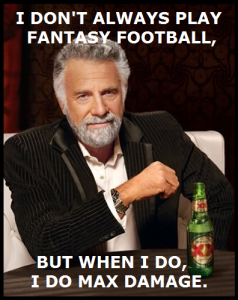 Last year, I was invited by a friend to join his Fantasy Football league. While I do maintain a healthy interest in pro sports (I’m required to cheer for an NHL team by Canadian law), my interest in the NFL was hard to rekindle after losing interest in pro sports during college. But I do enjoy watching the Super Bowl every year, and have teams I cheer for and teams I cheer against. I took him up on his offer, and stepped into a much more familiar world than I anticipated.
Last year, I was invited by a friend to join his Fantasy Football league. While I do maintain a healthy interest in pro sports (I’m required to cheer for an NHL team by Canadian law), my interest in the NFL was hard to rekindle after losing interest in pro sports during college. But I do enjoy watching the Super Bowl every year, and have teams I cheer for and teams I cheer against. I took him up on his offer, and stepped into a much more familiar world than I anticipated.
It starts with the fantasy draft. You select your stable of players from all 32 NFL teams. Teams consisted of a Quarterback, two Running Backs, three Receivers, one Tight End, a Kicker, the Defence and Special Teams of any one team in the league, and a Flex player, who could be from any position other than Quarterback or Kicker. Mine was a head-to-head league, where each week, your team faced off against someone else’s team. When a player on your team performs well in the game he’s playing on the field, he gets points in your game. Whoever gets the most points wins, and as the regular season winds down, the most successful teams face each other in a playoff bracket to determine the champion.
So you’d expect this to give long-time, hardcore NFL fans the advantage. They follow the game extensively, understand the positions, and might know which rising star to bank on and which veterans still have something left in the tank. And to some degree, this is the case and their understanding of the game, and passion for it, is an asset. But while the concept of fantasy sports seems like a jock’s playground, those of us with gaming know-how and experience have some key advantages, especially for those of us in head-to-head leagues. From a certain point of view, fantasy football is essentially D&D with linebackers.
Like combat in an RPG, attribute strategy is key. In Fantasy Football, each play gives you points, not that different from damage points. Your players have different attributes, and each has their place. Examining statistics and researching reputations of players with RPG attributes in mind can reveal an awful lot. The players with high strength are consistently ranked near the top of fantasy rankings, but those who favour other attributes are still valuable, and can sometimes be the better choice.
To use the most recent Super Bowl quarterback matchup as a rough example, Denver’s Peyton Manning has considerably more strength than Seattle’s Russell Wilson, but Wilson’s very high dexterity and perception, particularly compared to Manning’s, was what won him the day.
Luck, of course, plays a role. This is professional sports, after all, and anything can happen. There’s countless takes of improbable victories, epic collapses by superior athletes, and heroism from unlikely sources that become the stuff of legend and hagiographic reporting on ESPN. While it is impossible to quantify those kinds of things, the reputation of players can be telling. Certain players are known for performing better under pressure. Call it clutch, call it elite, call it lucky, opinions on who has it and who doesn’t are not difficult to find. It might not be important in all match-ups, but should one of your players be against a tough opponent in a high-stakes game, picking the one with the reputation of luck will make you look like a savvy veteran.
Another possible advantage is objectivity. While fantasy sports is essentially a numbers game, a passionate football fan’s intimacy with the game is also a weakness. In my particular league, I saw one player who stubbornly started his idol each week despite poor results, and another who turned down a proven asset because he hates the Colts. While there is certainly overlap between gamers and sports fans, those who approach their league as an RPG to win rather than a way to get more invested in their team’s season can make those strategic decisions with greater ease. As a means of testing your RPG strategy with the maximum objectivity possible, allow your team to be drafted automatically. This may cause some initial concern about your dedication to the league, but those concerns will vanish once you begin tweaking your lineup.
As someone who identifies as a nerd, but dabbles in jock territory, I found the RPG elements of Fantasy Football very intriguing. We’re worlds beyond the simplistic jock v. nerd stereotype from the 80’s, but there are still clear boundaries. Fantasy sports, however, blur the line more than I ever expected. So if you’re looking for an RPG that’s a little different, consider joining a Fantasy Football league… getting together in a local tavern near you.

One picture says it all…
http://i1256.photobucket.com/albums/ii499/Redlan89/fantasy-football-nothing-more-than-fantasy-football-for-jocks.jpg
Perfect!